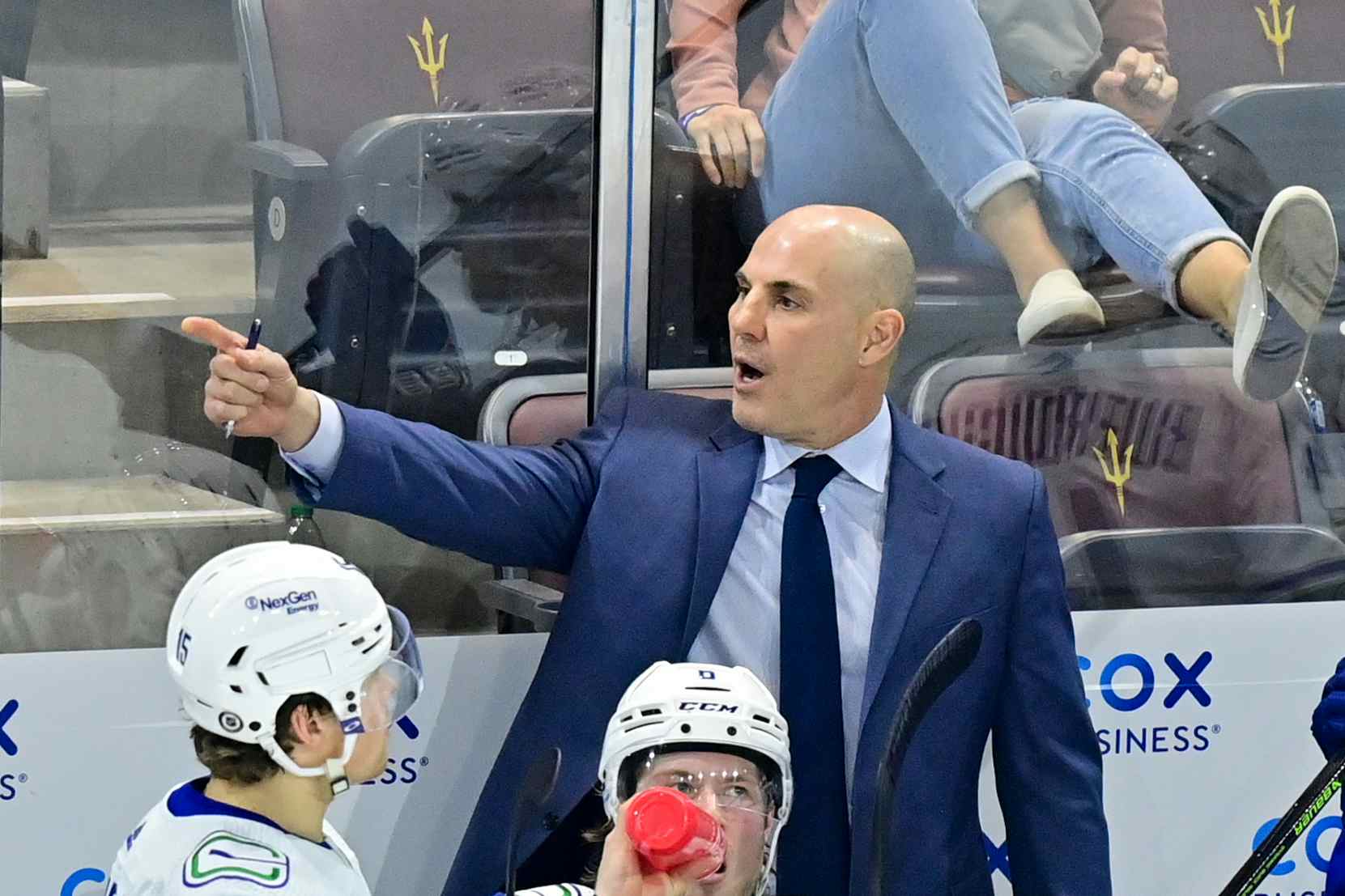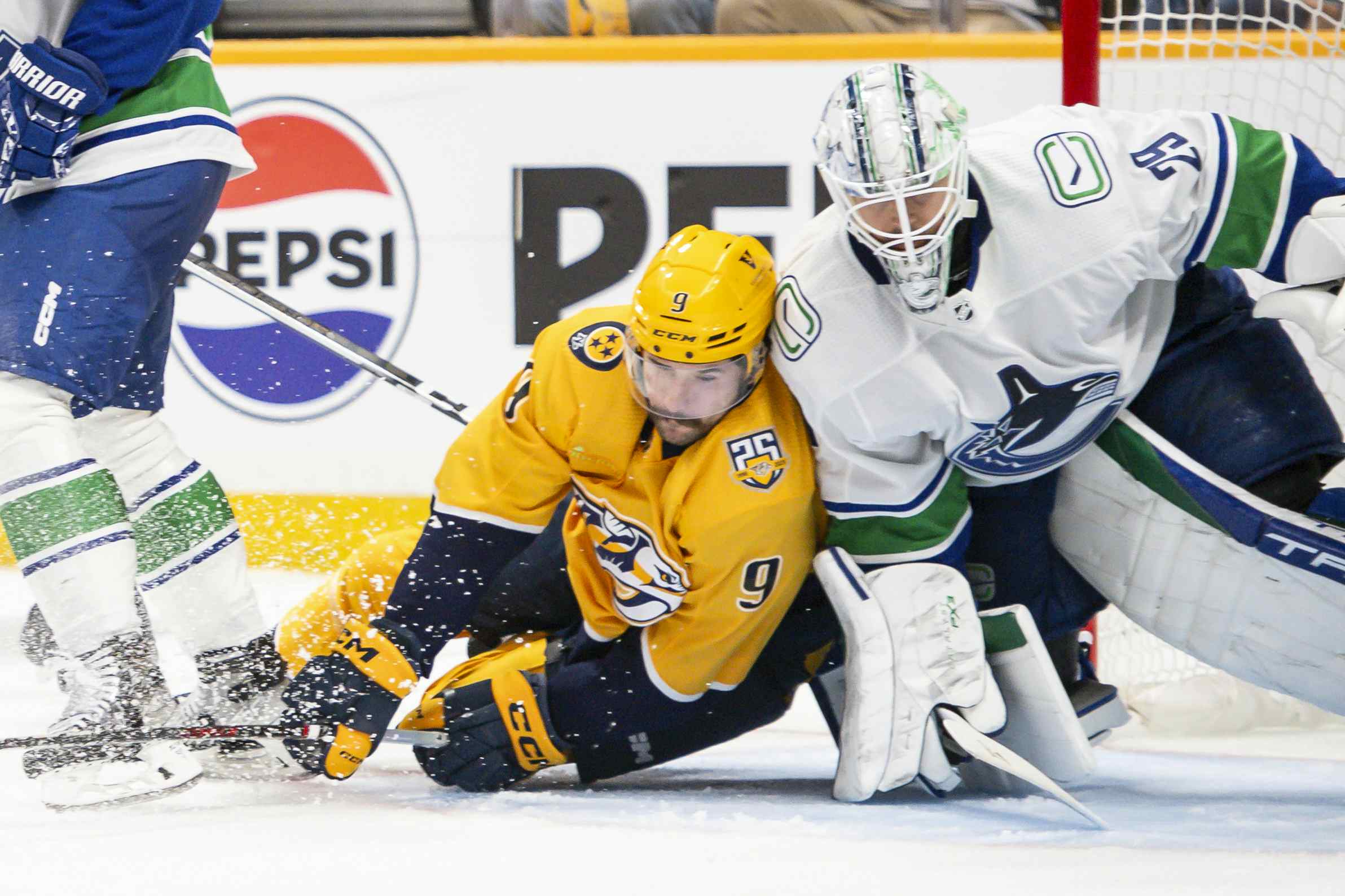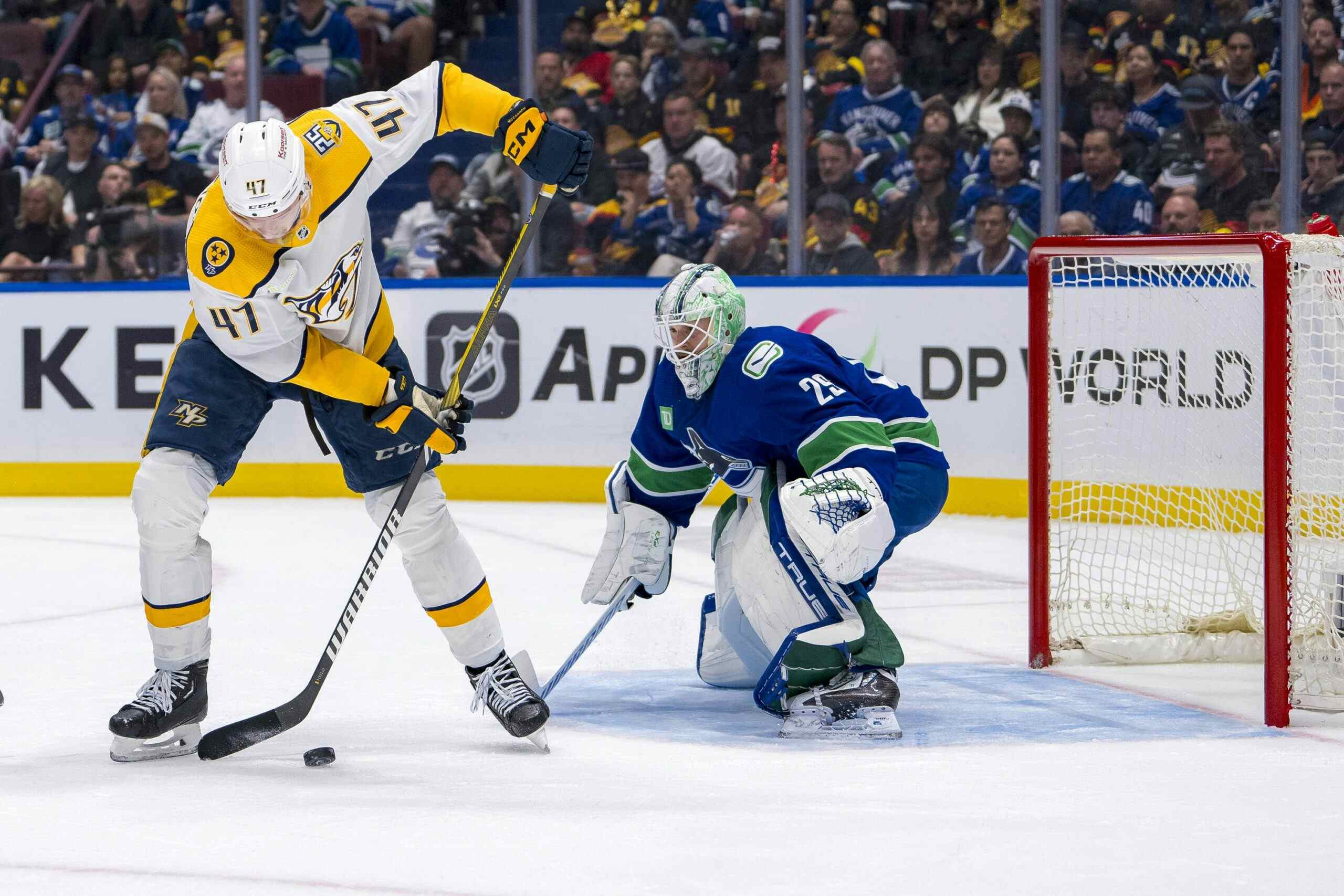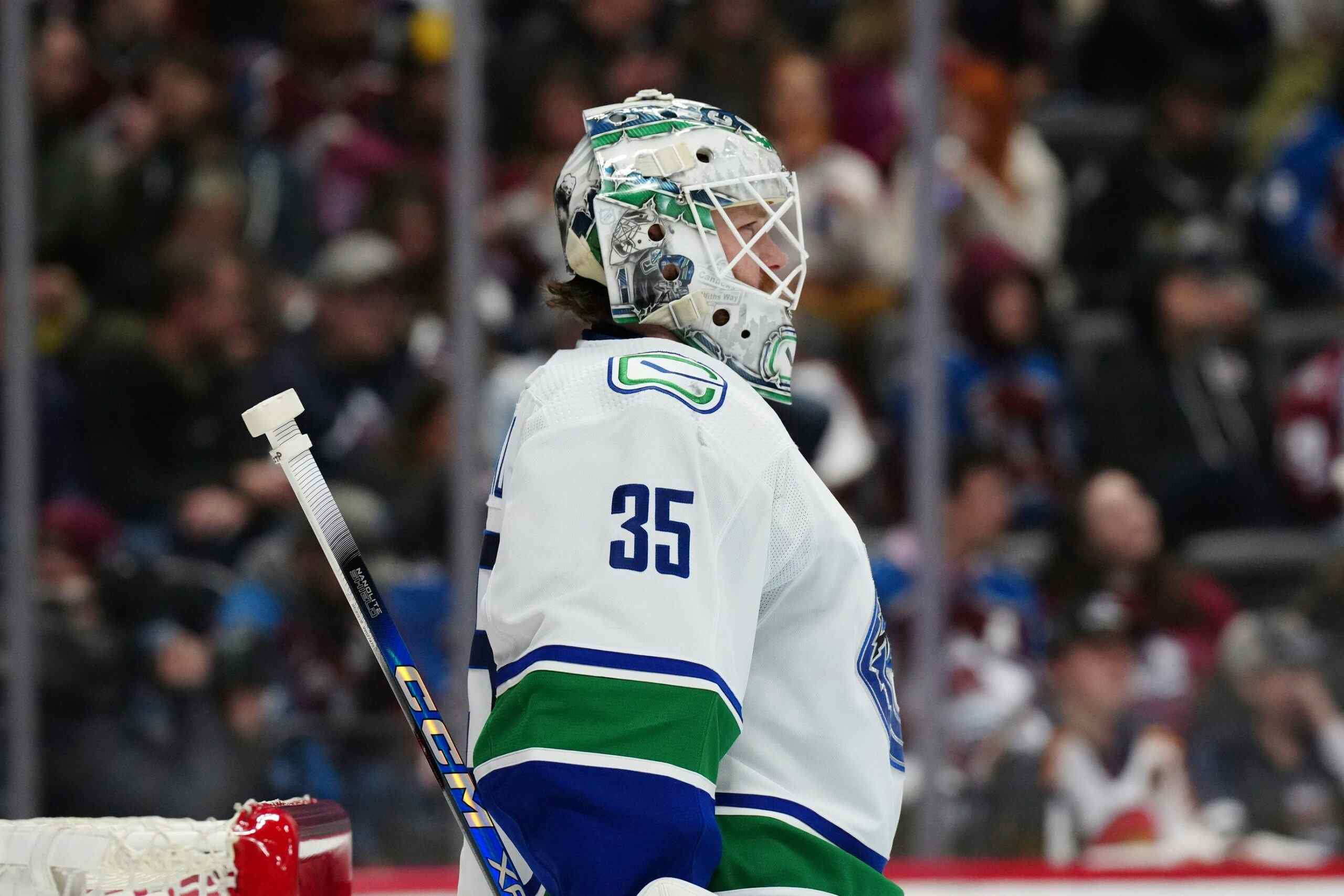Demko is making Markstrom’s departure more palatable, and that’s a best-case scenario for the Canucks
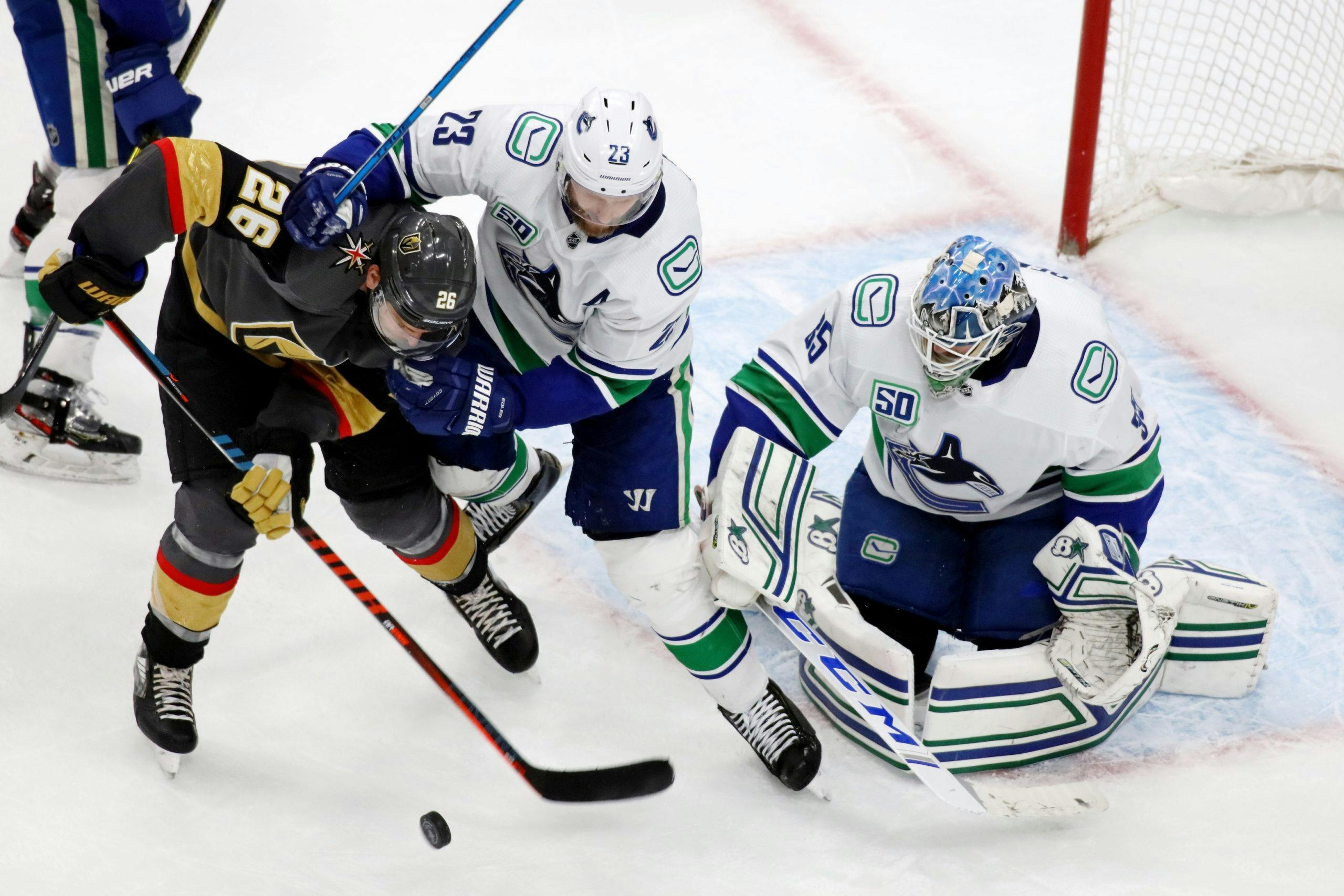
All season long — in fact, for two seasons running now, if we’re being totally honest — the Vancouver Canucks’ most valuable player has been their starting goaltender. That was certainly the case in last night’s Game Five, as the Canucks staved off elimination by the Golden Knights largely on the strength of another stellar performance from a goalie under near-constant siege.
Only, it wasn’t Jacob Markstrom putting the team on his back and making 42 saves for a win they probably didn’t deserve. Instead, it was the California Kid, 24-year-old Thatcher Demko, single-handedly extending the season in the wake of a surprise Markstrom injury.
And, looking at the long-term forecast, that just might be the best thing that could have happened to the Canucks this postseason.
Letting Markstrom walk
This offseason was always going to be a painful one for the Canucks, even before the United States failed to flatten the COVID curve and instead flattened the NHL’s salary cap for at least three years and counting.
Simply put, the Canucks couldn’t afford to keep everyone before — not while keeping ample room for the impending extensions of Elias Pettersson and Quinn Hughes in 2021 — and they certainly can’t afford to now.
With the possibility of ditching a high-profile anchor contract like Loui Eriksson or Brandon Sutter increasingly unlikely, it seems inevitable that a sacrifice will need to be made somewhere on the roster. And if that sacrifice ends up being Jacob Markstrom, it could very well be a blessing in disguise.
Here’s where we start treading into controversial waters. Markstrom is beloved in Vancouver, and rightfully so. He’s battled back from the waiver wire to whispers of Vezina contention, and personally protected the development of young stars like Pettersson and Hughes with the sort of goaltending that has kept the team in countless games it probably shouldn’t have been.
We’ll go as far as to say that, in terms of next season, there are very few scenarios in which the Canucks are better off without Markstrom than they are with him. Even the most fervent Demko devotees don’t believe he’ll be an All-Star by 2020/21, and there simply aren’t any goaltenders of the same quality as Markstrom available on the market.
But what about the year after that? And the year after that? And so on, and so forth?
You’ve no doubt heard this line of argument before, but it bears repeating now, on the cusp of Markstrom either re-signing or being allowed to walk as a UFA. Most would agree that re-signing Markstrom will require both significant term, probably five years at the least, and an average salary well north of $5 million.
Is Markstrom worth that now, and in the immediate future? Absolutely. But as the 30-year-old netminder ages, and as his younger teammates begin to demand their fair share of the salary pie, that sort of contract is going to become a lot less palatable.
Especially if the Canucks have another option available that will cost far less and still have significantly greater growth potential.
So, do they?
Doubling down on Demko
The key factor at play when deciding whether to roll with Markstrom or Demko as the starter moving forward has been uncertainty regarding Demko’s potential. He sure looks like someone who could be a number one goalie in the NHL, possibly as soon as next year, but that’s far from a guarantee — the development of a goaltender is a notoriously fickle and unpredictable process.
With Markstrom standing in the way of Demko’s opportunity to prove himself under a starter’s workload, betting on Demko as the ongoing backstop of this core group of Canucks was always going to be a gamble.
But opportunity is knocking, and Demko is answering one figurative door by keeping another slammed shut.
Now, one dazzling playoff debut — even a 42-save effort against the most potent offence in the Western Conference — does not make the decision to move on from Markstrom to Demko a slam-dunk by any stretch of the imagination. But it does help, and it’s important to remember that this is not the first time Demko has stepped up to fill a void left by Markstrom.
When the schedule got heavy at the tail-end of the 2018/19 season, Demko began trading starts, and sparkling save percentages, with Markstrom to close out the year.
Then, when Markstrom was injured in February of 2020, Demko — after an initial adjustment period — shone in his first real opportunity as an NHL starter. That all culminated in a 45-save shootout win against the New York Islanders on March 10, easily Demko’s brightest big-league performance yet.
Then, a global pandemic powerful enough to halt even a Vancouver goalie controversy.
To see Demko pick right up where he left off six months later and put up an even more impressive display of goaltending goes about as far toward proving him as Markstrom’s heir apparent as a single game possibly could.
And if he continues these sorts of exploits in game six — and especially, if we may be so bold, game seven — then it goes even further. Betting on a young goaltender is always a gambit, but betting on one with a strong playoff record, even a brief one, is a lot more appetizing.
One, two, or three great postseason outings from Demko does not make the choice of him over Markstrom moving forward an open-and-shut case. But it does make the decision that the Canucks probably should make this offseason a lot easier to stomach, and that’s a long-term win.
What do the Canucks get out of choosing Demko?
If the Canucks roll with Demko as their starter next season and let Markstrom walk, they’ll almost certainly take at least a slight hit in the quality of their goaltending. As we’ve already mentioned, even the most ardent Demko supporters don’t think he’ll reach the same current heights as Markstrom for at least a couple seasons, if ever.
But the detriments wrought by the change in the crease might be outweighed by the benefits elsewhere on the roster.
Not committing significant funds to Markstrom opens up ample space for Chris Tanev and Tyler Toffoli extensions, two important players who are far less replaceable than Markstrom. It should also, with a little extra shuffling elsewhere, leave room for modest raises to Adam Gaudette, Jake Virtanen, Troy Stecher, and Tyler Motte. Yes, that’s right, we’re now lumping Motte in with the other important RFAs, deal with it. Put simply, not spending $6 million on a starting goaltender provides a large chunk of cap change to be spread around the rest of the roster.
Demko, on the other hand, is signed through the 2020/21 season at a cap hit of $1.05 million. Even if the Canucks hand the keys to the crease over to him, he’ll be negotiating his next contract in 2021 off the strength of just one season as starter, meaning his salary should come in somewhere around half of what Markstrom is projected to sign for this offseason.
That makes the re-signing of Pettersson and Hughes, easily the franchise’s highest long-term priorities, a lot smoother. It allows the Canucks to transition past some regrettable contracts and into a new era without having to give up any core pieces.
Without having to give up any core pieces, that is, aside from Jacob Markstrom. But an organization only needs one core goaltender, and if Demko can be that person — as it certainly looked like he was last night — it constitutes a best-case scenario.
Or, at the very least, a significant silver lining to the dark cloud of losing one’s MVP on the eve of an elimination playoff game.
Recent articles from Stephan Roget

